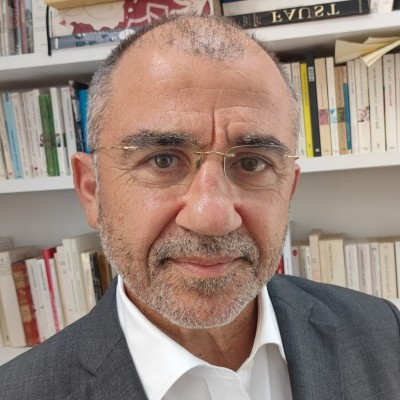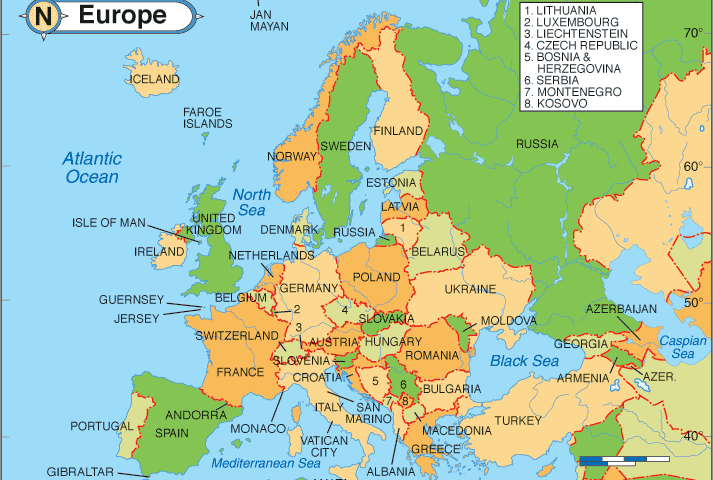What is Europe? Is she the princess with big eyes who, clinging to the back of a huge bull, crossed Mediterranea from Tyre to Crete? This traumatic event marked the shift of human civilization core from the East to the West. In their quest, Europe’s brothers, who went in search of her, brought the alphabet and many other things to Greece, thus weaving the cradle of such Europe, Byzantium, that would harden up against a common enemy, Persian Asia. This European infant survived barbaric conquests that defeated the Western Roman Empire.
Later, he found, in the infidel, the enemy who, for 700 years, allowed him to anchor young countries of the North to the old ones from South, that will lead to the great Europe of Renaissance and Enlightenment.
While Europe hoped to expand further to the West, it was trapped by its pride and played the role of the founding enemy against which America erected itself. This process ended with the changeover of world economic domination from Britain to United States after the Great War.
Yet, when entering the 19th century, Europe saw Napoleon as the saving enemy who, too quickly defeated, too soon disappeared, gave way to the Austro-Hungarian Empire domination. The period of peace that followed, sees the breeding ground for the awakening of Nationalities, which led to three terrible world conflicts until the second half of the 20th century.
By that time, the shadow of the Soviet Union, which had become sufficiently threatening, crystallized fears and forced modern Europe to emerge from the rubble, sown by the American Marshall Plan. Designed to reinvigorate as quickly as possible countries that were to contain the Red Ogre, the plan was led by a trio of Freemasons, Roosevelt, Marshall and Truman. They gave to Europe the responsibility of selecting and leading projects to lead, and thus to locally decide of its future. The plan had two pillars : an organization, the Administration of European Cooperation (AEC) allowing a joint supervision of the plan ; and credit lines, conditioned on the purchase of American goods and services, supplemented by taxation. He sowed the seeds of the current OECD and NATO and it is not stranger to the birth of the CECA, then the EEC and finally the EU.
The highlight of this astounding process was the creation of the euro, following the joy of the fall of the Berlin Wall in 1989. One might have expected that this disappearance would have opened the way to light and expansion, and not to the defect of the common enemy whose emptiness left its mark on the old demon of nationalism. The fire is still burning and threatens, once again, in the mirrors of history, to consume the entire house.
Europe is no longer the one from which the third block has emerged, the moderator of a bipolar world, quite the contrary, the world doubts its ability to retain the appetites of newcomers. The countries of Eastern Europe prefer to shelter under an hypothetical American umbrella rather than devote themselves to an undeniable European impotence: paralysis in Ukraine, American customs threats and relations with Iran,…
Britain, which had supported the continental countries during the French revolution and contributed to the definitive victory over Napoleon, the kingdom that had thus joined the continent, is now showing its willingness to leave. The Brexit sends it back into the Anglo-Saxon axis which had only saved Europe to block the way to the USSR.
What are the next steps? Europe is at a standstill, it has rejected the Constitution that would have modernized its institutions, it has continued to age and slow down, without any further hope of expansion. It leaves out countries that have made its history, such as Albania, Montenegro, Serbia… It has favoured rent over work, the elderly over the young, bankers over people. On the world stage, occupied by bilaterality, her voice is barely heard. Africa’s promises are being disputed by the United States and China, whereas history had opened it up.
Where is the old Europe that Dominique de Villepin invoked in front of the UN in 2003? Where is the old continent of the old country of France, which has known barbarism, war, occupation, who knows what it owes to the freedom fighters of the world? Well, it’s still there. If Britain leaves the European Union, it does not leave the Council of Europe, of which Albania, Montenegro, Serbia, Turkey and Russia are already members. It includes 47 European countries, with the exception of Belarus. The Council of Europe represents its fundamental values, enshrined in the Convention on Human Rights and defended by the European Court of Human Rights.
Europe is a slow-moving European Union, which is nevertheless progressing towards democracy and a Europe of peoples. Recently, Parliament extended the European Budget against the Commission’s opinion, and mechanically increased the countries’ contribution. At the December 9 summit in Paris, Russia made significant concessions to resolve the crisis in Ukraine, Europe is a better choice than the American enemy.
With the awakening of Africa, in the coming years, Europe will regain the pivotal position of the civilized world. It will be better prepared and will be able to play the role of moderator in a geopolitics that is primarily played out on the economic field instead of the battlefields. It will be a democratic Europe, carrying the old values that it has always defended since Enlightenment.
By these times, it will have become an economic Europe that will have solved the difficult equation of energy transition and ageing. It will be the continent of the civilization of the fraternity, of work, of social solidarity, of education and of equality.

